ELECTRIC, WITH AN EDGE
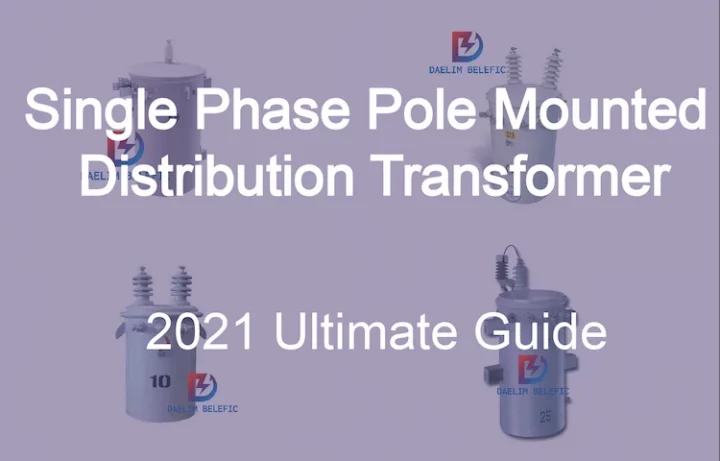
Distribution Transformers are a popular option for home and commercial applications.
They are mainly used to convert high voltage to low voltage levels at 120 or 240V to supply electrical power.
Generally, the biggest drawback of distribution transformers is that they aren’t designed for continuous operation.
If the line voltage fluctuates or experiences undue voltage drop along the power cable, the transformer will not recover and fail to maintain its proper operating conditions.
Hence, the single-phase pole-mounted distribution transformer is becoming popular today, especially in rural areas.
In this post, you will learn about the single-phase pole-mounted distribution transformer and why you might need one.
DAELIM is the world’s top professional transformer and electrical equipment manufacturer.
This top-performing transformer and equipment manufacturer has been a reliable and trusted brand for more than 15 years.
Following international standards like ANSI, IEEE, IEC, CSA, AS/NZ, etc., DAELIM upholds these standards with inexpensive, high-quality products.
2021 Ultimate Distribution Transformers Guide
-Since a lot of customers buy due to their Distribution transformer working principle and easy Installation of the distribution transformer.
Electric Pole Transformer | Single Phase Transformer
-Learn the fundamentals of Electric Pole Transformers, including What is pole mounted distribution transformer, pole mounted transformer specifications, pole mounted transformer drawing, pole mounted transformer sizes and custom options.
8+FAQ About the CSP Transformer
-A completely self-protected transformer (CSP) is designed to protect electrical equipment from damage caused by lightning, switching surges, and severe overloads.
A pole-mounted transformer is an electrical utility distribution transformer commonly mounted on an electrical service pole.
The service pole can be made of either wood or concrete.
Usually, these types of transformers are found at overhead cables.
Moreover, pole-mounted distribution transformers are the breadbox transformers that convert high-distribution voltages to 120 or 240V voltage levels.
Consumers use these voltage levels in homes and low-volume commercial installations.
Normally, pole-mounted distribution transformers in rural areas range from 16 kVA to 100 kVA.
These transformers can transform as high as 11,000 to 33,000 volts to a voltage level of 400 volts.
Because these transformers are found at overhead cables, they are inaccessible to people and animals.
Therefore, reducing the risk of injury, vandalism, and accidents brought about by these transformers.
In addition, pole-mounted distribution transformers are also reliable during harsh climates.
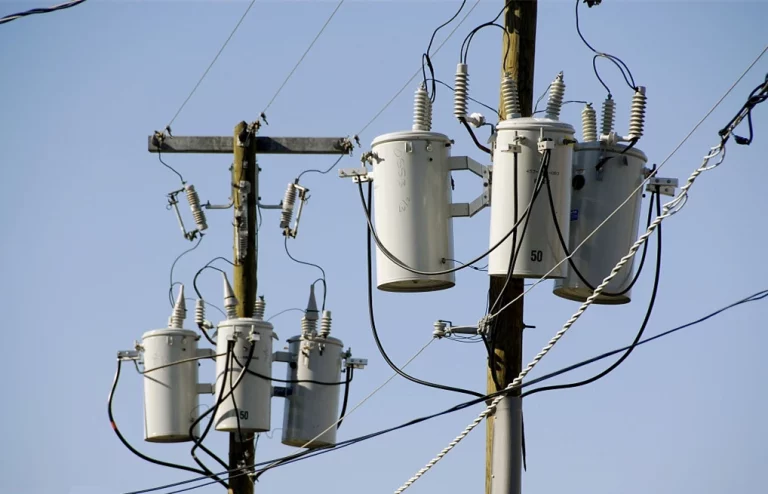
A single-phase distribution transformer is a power distribution transformer that relies on a single-phase AC operating on a unified time phase.
This power transformer is commonly used to step-down localized transmission currents at long distances.
These transmission currents are lowered into voltage levels needed by end-users.
Utility infrastructure and industrial regulations dictate the highest voltage allowed in a network of single-phase distribution transformers.
The area where these transformers will supply power is mainly dependent on different single-phase distribution transformer sizes.
For electrical appliances, the low voltage output is rectified into DC first before supplying power.
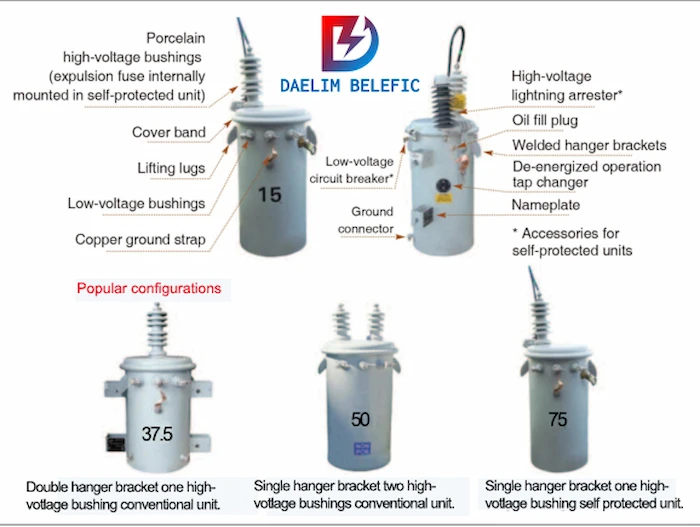
One of the key advantages of single-phase overhead transformers is their affordable price. Moreover, they are relatively cheaper compared to three-phase transformers.
Other advantages of single-phase overhead transformers include:
Single-phase pole-mounted transformers are commonly used for voltage reduction and distribution to supply power in residential and commercial areas.
In addition, they are used for networks that do not require three-phase transformers.
These distribution transformers can also be used to repair overhead distribution loads, industrial lighting, light commercial loads, and other electrical applications that are not heavy-duty.
Of course, single-phase pole-mounted transformers often need side rectifiers when providing power to different electrical appliances.
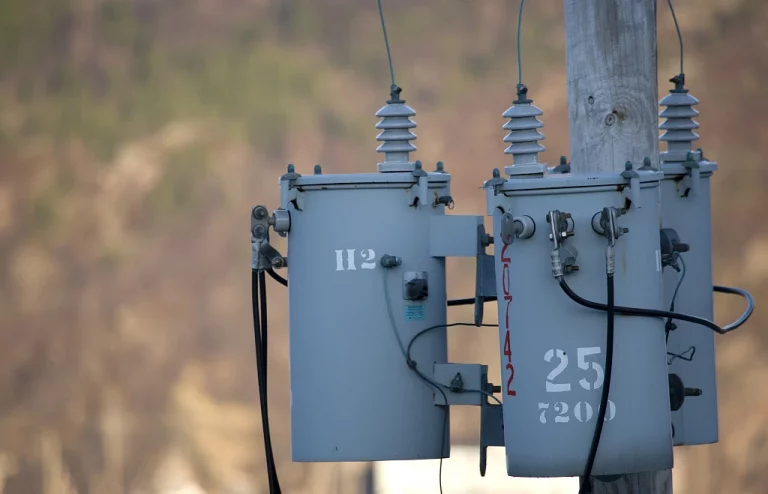
A pole-mounted transformer is a utility distribution transformer mounted on an electric service pole.
Generally, this type of transformer is commonly used in residential and commercial areas requiring industrial lighting with light loads and power applications.
On the other hand, a pad-mounted distribution transformer is encased in a steel cupboard and sits on a small concrete pad.
Moreover, this transformer is usually placed in areas that lack space for fenced enclosures.
In addition, pad-mounted distribution transformers are used with electric power lines at overhead electrical lines.
They are mainly for stepping down primary voltages to the level the consumers need.
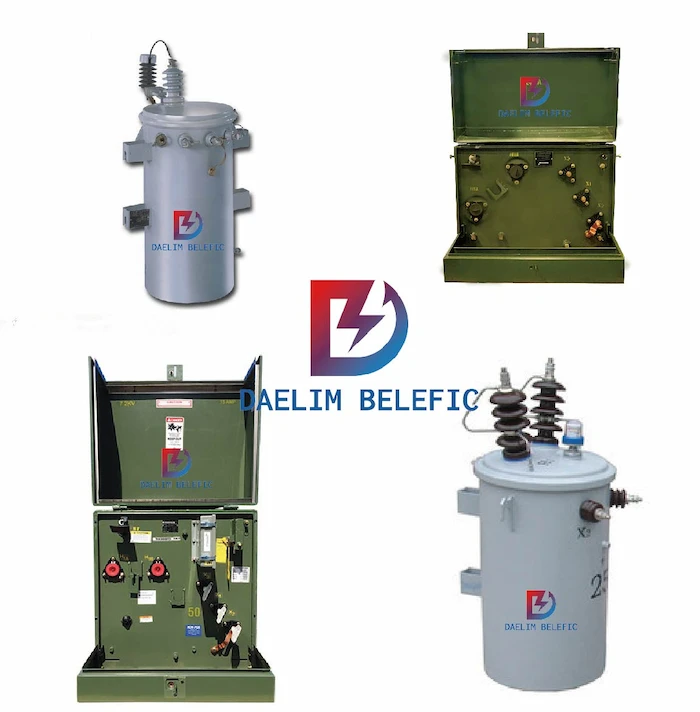
A single-phase transformer has two windings connected on each side – the primary and secondary winding.
In contrast with the three-phase transformer, this consists of three single-phase units attached to one three-phase system.
Meaning that three-phase transformers have three windings or coils connected in an optimal sequence for maximum function.
Generally, pole-mounted three-phase transformers are more expensive because they are used in high-power systems.
They are typically stronger and are more common in dense urban areas.
Furthermore, cities are where most power demands need transformers that can generate high power in hundreds or thousands of kVA.
The advantages of a three-phase transformer include:
In addition, three-phase transformers also supply power to areas that need high voltage, such as apartment buildings, factories, retail centers, offices, and other large-scale structures.
One disadvantage of three-phase transformers over single-phase transformers is the maintenance.
In case of failure, the entire unit of a three-phase transformer needs to be replaced.
In comparison to single-phase transformers, you only need to replace the faulty or broken part.
Describe the difference between single-phase and three-phase in detail.

Generally, the requirements for pole-mounted transformer installation are the following:
1. Pole-mounted transformers should be installed close to where the load center is. Doing this will reduce line power and line voltage drop. Moreover, the area where you plan to install the transformer should also be convenient for maintenance and repair.
2. The following distances should be noted when installing pole-mounted transformers:
3. A height of 3.5 meters or more for all exposed charged objects placed on the transformer platform is recommended.
4. There should be warning signs placed at least 2.5 to 3 meters above the ground.
5. The pole-mounted transformer station should not be installed in areas with flammable and explosive gases. Moreover, it should be located near the unit that consumes the most electricity.
6. The voltage drop of the furthest electrical equipment should only be within the allowable range.
7. The distance between high and low voltage lines should be greater than 1.2 meters, especially on the same pole. Of course, the low voltage line should also be located below the high voltage line.
Transformers are mainly used to lower voltage levels to suit the levels end-users need. Different areas need different types of transformers.
You must learn which transformers are suitable for your area.
Thus, ensuring your safety and the stability of your electrical power.
Keep in mind, Single-pole mounted distribution transformers are mainly for residential areas, electronic devices, and light commercial areas.
These transformers minimize the risk of injury and unfortunate accidents because they are installed at overhead cable lines.
At DAELIM, you are guaranteed safe, durable, and high-quality transformers.
These transformers are guaranteed their price worth that will certainly last for years to come.
Here At Daelim, we know that you value your transformer products.
All our transformers are made with premium, trusted, and durable materials to suit your transformer needs.
If you find that the existing distribution transformer types or power cannot meet your requirements. You can choose to tell Daelim. Daelim has a team that has always had a wealth of design transformers, and can give you a specific design plan in the shortest time.
Daelim’s distribution transformers comply with IEEE, ANSI, CSA, IEC certification, and are used in North America (such as Canada, the United States, Mexico), South America (such as Ecuador, Chile), Europe (such as Spain, Lithuania) and some Asian countries. Daelim even has a professional installation team that can provide you with installation services.
ELECTRIC, WITH AN ENGE-- DAELIM BELEFIC
After filling in the contact information, you can download the PDF.